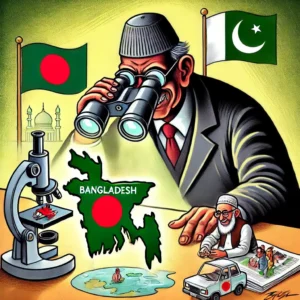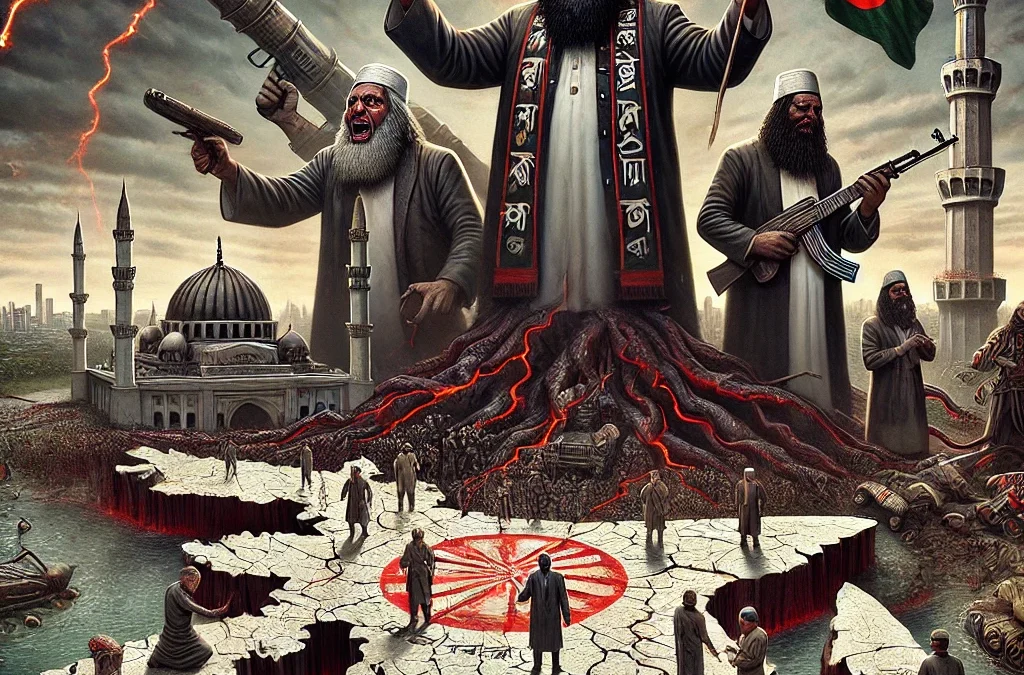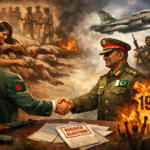Bangladesh: A Nation on the Brink?
Bangladesh, a nation with a rich history and diverse culture, faces uncertainty and potential upheaval. Recent events have led to growing concerns about the influence of radical Islamist groups within the country, raising questions about the future of its secular democracy and its place in the global community.
One figure at the centre of this controversy is Dr. Muhammad Yunus, a Nobel Peace Prize laureate and renowned economist. While Dr Yunus is widely respected for his work in poverty alleviation through microfinance, some critics have accused him of harbouring an Islamist agenda and using his platform to promote radical ideologies.

Furthermore, Bangladesh’s status as the country with the largest Muslim population outside of the Arab world has fueled speculation about its potential to become a hotbed for extremism. This, coupled with its strategic location in South Asia, has raised concerns about the potential impact of a radical takeover on regional and global stability.

A Fool’s Paradise: The Delusion of Reuniting Pakistan’s Two Wings and the Inescapable Legacy of 1971
The situation in Bangladesh is complex and multifaceted. It is crucial to approach the issue critically, considering all perspectives and avoiding generalisations. However, the potential consequences of an Islamist takeover cannot be ignored. Such an event could have far-reaching implications for the region and the world, potentially destabilising the delicate geopolitical balance and increasing conflict and violence.
It is crucial to remain vigilant and monitor the situation in Bangladesh closely. Open dialogue and engagement with all stakeholders are essential to address the underlying issues and prevent a potential radicalisation of the country. The international community must also play a role in supporting democratic values and promoting peaceful coexistence in Bangladesh.
The future of Bangladesh hangs in the balance. Today’s choices will shape the country’s destiny for generations to come.

Bangladesh is being observed
Human Rights and Minority Safety
The erosion of human rights and the targeting of minority groups are significant concerns in Bangladesh. Freedom of speech, assembly, and association have been increasingly restricted, with journalists, activists, and opposition politicians facing harassment, intimidation, and arbitrary arrests. The government has been accused of using repressive laws like the Digital Security Act to stifle dissent and silence critical voices.
Religious minorities, including Hindus, Buddhists, and Christians, have reported rising incidents of discrimination, violence, and attacks on their places of worship. These communities, which have historically been an integral part of Bangladeshi society, now live in fear for their safety and security. The lack of adequate protection and the slow pace of justice in cases of religious violence have further eroded their trust in the state.
Economic Impact and Threats to Neighboring States
An Islamist takeover in Bangladesh could have severe economic consequences. Foreign investment, crucial for the country’s economic growth, could decline significantly as investors become wary of the political instability and potential for extremism. The garment industry, a major financial contributor, could also be affected by boycotts and sanctions from Western countries.
Furthermore, an Islamist-dominated Bangladesh could pose a threat to regional stability. Extremist groups could exploit the country’s porous borders with India and Myanmar to infiltrate neighbouring countries and carry out attacks. This could lead to increased regional tensions and conflict, potentially destabilising the entire South Asian subcontinent.

Sliding down
Conclusion
The potential rise of Islamist extremism in Bangladesh is a serious concern with far-reaching implications. The erosion of human rights, the targeting of minorities, and the threat to regional stability are just some of the potential consequences. The international community must closely monitor the situation and take steps to support democratic values and promote peaceful coexistence in Bangladesh.







